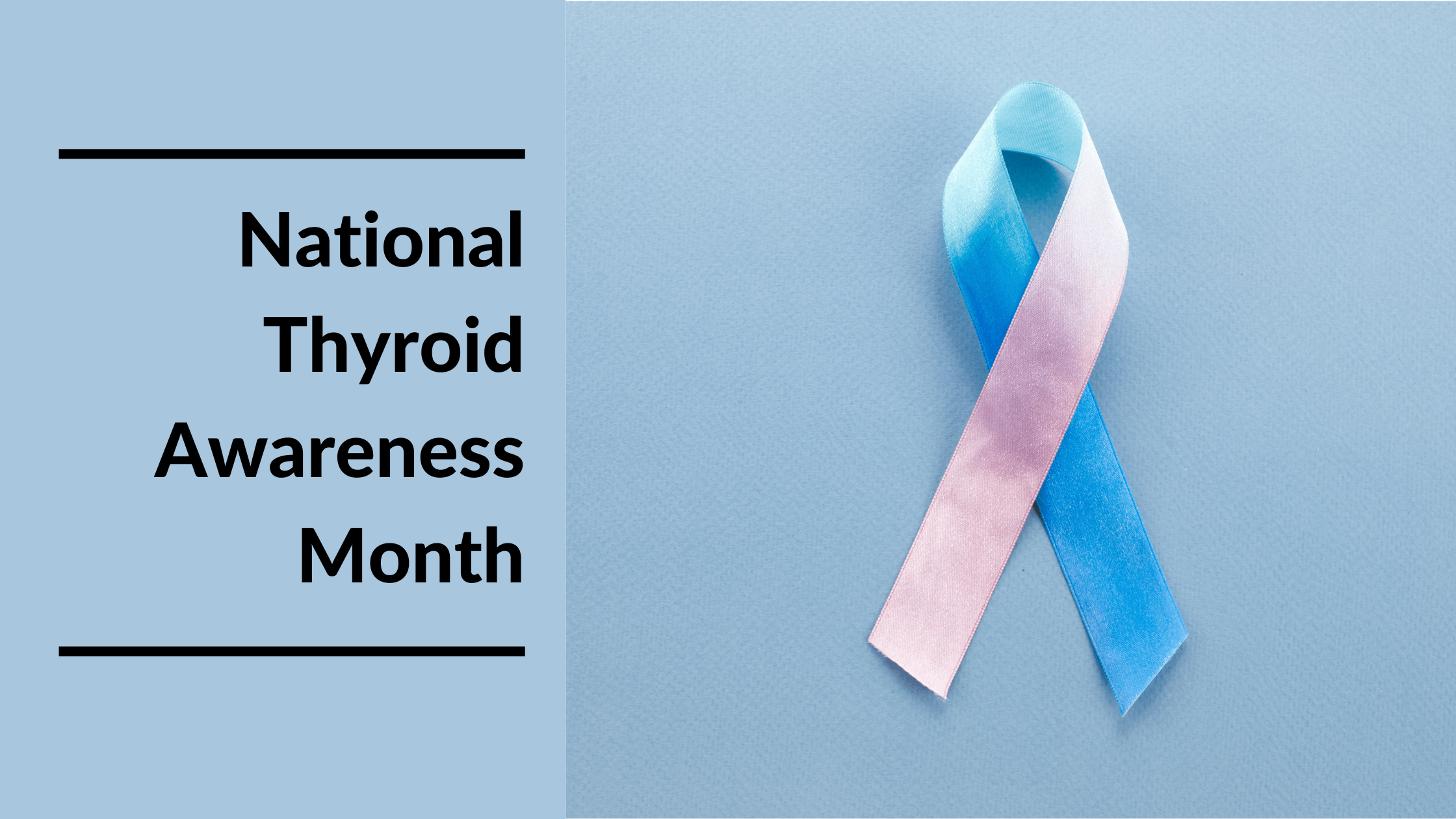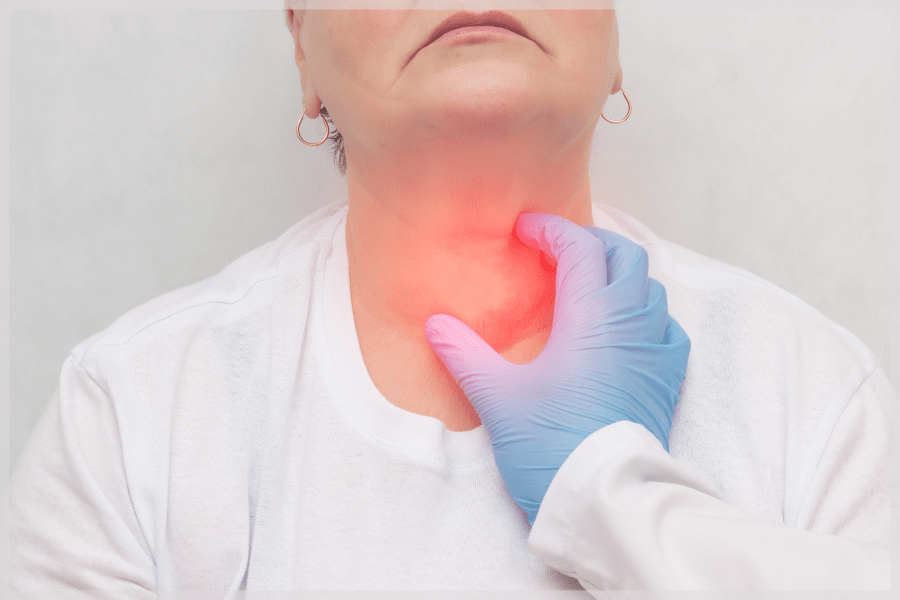
Many people don’t realize how important the thyroid is to overall health. Thyroid Awareness Month aims to educate people about thyroid disease and the importance of preventative care.
Updated October 6, 2022
January Is Thyroid Awareness Month
Most people reassess their health in the first month of the new year. But, since January is also Thyroid Awareness Month, now is the time to learn about this often overlooked (but no less crucial) gland.
Throughout the month, the American Thyroid Association (ATA) hosts programs and events aimed at outreach, education, and fundraising to continue preventing, treating, and curing thyroid diseases and cancer.
Thyroid Awareness Month Raises Awareness About Thyroid Health
Researchers have established a strong correlation between thyroid problems and mental health. An irregular thyroid gland produces not only physical problems but psychological ones as well. For example, anxiety, depression, mood swings, and issues with sleeping can all be because of a dysfunctional thyroid. Consequently, these symptoms frequently go misdiagnosed as mental health disorders.
In addition, poor thyroid health can cause short-term memory loss, difficulties concentrating, and reduced mental clarity. These signs could be mistaken for early dementia in older adults. For this reason, Thyroid Awareness Month advocates for greater awareness and education about this complex disease.
What Is The Thyroid?
Many people do not realize the vital role that this small, butterfly-shaped gland plays in the body’s overall health.
The thyroid is a central part of the endocrine system, which uses hormones to regulate body growth, sexual development, metabolism, and more.
The thyroid gland is situated on the lower front part of the neck. It produces hormones, which are critical for healthy organ development and processes. Every tissue in the body uses thyroid hormones to maintain its health and functionality.
The other aspect of the endocrine system is the pituitary gland, which tells the thyroid to produce hormones. When a problem between the thyroid and pituitary glands arises, it can be detrimental to the rest of the body.

Many don’t realize the thyroid’s significance or consider how many processes it helps maintain. Here are some of the main functions affected by the thyroid:
- Sleep
- Digestion and metabolism
- Body temperature regulation
- Cardiovascular and cognitive functions
As it is, many who struggle with these processes may not realize it is due to thyroid issues.
What Is Thyroid Dysfunction?
Thyroid dysfunction has many forms, and the long-term effects of untreated thyroid disease can be devastating.
Hyperthyroidism is the most common type of thyroid disease and is more common in adults under 50. This condition causes the gland to produce excessive hormones, negatively impacting the body. For seniors, hyperthyroidism is a risk factor for high cholesterol and heart disease. It can also increase the risk of osteoporosis.
Hypothyroidism, on the other hand, generally appears in those 60 and older. Unfortunately, this form is difficult to detect as it has broad, generic symptoms, particularly in seniors. Hypothyroidism is characterized by fatigue, cold sensitivity, weight gain, dry skin, joint pain, muscle stiffness, constipation, and depression. These non-specific signs often are the reason why this form of thyroid dysfunction is underdiagnosed.
Chronic lymphocytic thyroiditis is one of the most common causes of hypothyroidism in Americans. Also known as Hashimoto’s Disease, this condition occurs when the immune system attacks and gradually destroys the thyroid gland until it can no longer produce hormones.
Like most thyroid diseases, symptoms often are undetectable or appear as other health issues. About 14 million Americans are affected by this condition, which can develop at any age. However, middle-aged women are most at-risk for Hashimoto’s Disease. But a dysfunctional thyroid doesn’t always manifest as an easily discernable health problem. It can also appear as another condition, such as an autoimmune disease, goiter (enlargement of the thyroid), or cancer.
What Are The Symptoms Of Thyroid Disease?

Since older adults are more at risk for developing thyroid disease, it’s essential to learn the signs before it’s too late. It’s possible to miss symptoms of this condition in seniors because they may experience more indirect signs or none. Or, a dysfunctional thyroid may be misinterpreted as symptoms of aging (e.g., fatigue, body aches, high cholesterol, hair loss).
As a result, seniors are less likely to receive a proper diagnosis and get the necessary treatment. That is why spreading awareness and teaching adults about thyroid health is needed.
Here are the key symptoms of thyroid disease:
- Tremors
- Sweating
- Hair loss
- Body aches
- Sleep issues
- Fast heartbeat
- Fatigue/lethargy
- High cholesterol
- Vision problems
- Muscle weakness
- Increased appetite
- Swelling in the neck
- Irregular bowel patterns
- Anxiety and nervousness
- Dry skin and brittle nails
- Hands feel numb or tingly
- Unexplained changes in weight
- Reduced body temperature regulation, e.g., feeling too hot or too cold
If you or a loved one are experiencing these problems, Thyroid Awareness month is a great time to discuss it with your doctor.
What Factors Increase The Risk Of Thyroid Disease?
As a whole, thyroid diseases are more common than heart disease and diabetes. About 30 million Americans have thyroid disease, and more than half remain undiagnosed. Although it can occur in anyone, the likelihood of developing this condition increases with age.
Women are also more susceptible to experiencing thyroid issues. An estimated 20% of women 60 and older develop thyroid disease. In addition, women between 25 and 60 are three times more likely than men to develop thyroid cancer. By 2020, the number of female thyroid cancer cases will reach 70,000 – double what it was in 2014. The most significant risk factor is a family history of thyroid problems.
Testing And Treatment For Thyroid Disease
There are ways to test yourself at home. However, regular check-ups with your doctor are essential for monitoring your thyroid gland. Proper testing for thyroid disease is performed by measuring the body’s thyroid hormone levels with a blood test.
But if you are waiting for your next appointment, here is how you can test your thyroid at home.
- Hold a hand mirror in front of your neck, above your collarbones. Pay attention to the area below your Adam’s apple.
- Lean your head back and take a sip of water.
- Swallow the water, and keep an eye on your neck for signs of swelling.
- Repeat several times to ensure you don’t see apparent indications of bulging.
- If you notice any abnormalities, call your doctor.
Additionally, the ATA offers a free brochure on the essentials of thyroid testing and information about this gland. Remember, this self-test is not a diagnosis, and you should always follow up on any concerns with your physician.
Fortunately, hyper- and hypothyroidism are both treatable conditions, usually with medicine or other strategies. But to effectively manage symptoms, family members and caregivers must be aware of new signs and be ready to share recent developments with the doctor.
Medications must be taken daily at the same time and should be taken half an hour before breakfast. Some foods, such as soy, calcium, and iron, may decrease the medicine’s absorption, so patients must wait several hours to eat these foods after taking their medication.
Don’t wait until it’s too late. This Thyroid Awareness Month, find out more about how you can be more proactive about your health.
MeetCaregivers Supports National Thyroid Awareness Month
If you or a loved one are affected by a dysfunctional thyroid, staying on top of routine tasks and self-care can be challenging. A qualified caregiver can help with routine care, assist with medications for thyroid treatment, and assist with transportation to appointments.
For more information and resources about senior health and safety, visit the Blog.
Call 1 (888) 541-1136 to chat directly with a care manager. Or, get started today and Find A Caregiver.
- American Thyroid Association. (2019). Thyroid Function Tests. Alexandria, Virginia; American Thyroid Association. Retrieved January 20, 2020, from http://www.thyroid.org/wp-content/uploads/patients/brochures/FunctionTests_brochure.pdf.
- Casa Companion Homecare Solutions. (2018, January 4). Caregivers 101: Thyroid Awareness Month. Retrieved January 20, 2020, from https://www.casacompanionhomecare.com/caregivers-101/thyroid-awareness-month/
- Geipel, M. (2017, January 12). Thyroid Awareness Month: Recognizing the Symptoms of Thyroid Disease. Thyroid Awareness Month: Recognizing the Symptoms of Thyroid Disease | VistaPrairie Communities – Blog. Retrieved January 20, 2020, from https://vistaprairie.org/blog/thyroid-awareness-month-recognizing-the-symptoms-of-thyroid-disease/
- Office on Women’s Health. (2021, February 22). Thyroid disease. Thyroid disease | Office on Women’s Health. Retrieved January 20, 2020, from https://www.womenshealth.gov/a-z-topics/thyroid-disease
- Senior Living Experts. (n.d.). Thyroid Health in Elderly – Do You Know How Important Your Thyroid Is? Retrieved January 20, 2020, from https://www.seniorlivingexperts.com/post/thyroid-health-in-elderly-do-you-know-how-important-your-thyroid-is
- Unicity Healthcare. (2019, January 11). January Is Thyroid Awareness Month: Calling Attention To Thyroid Disease In Seniors. January Is Thyroid Awareness Month: Calling Attention To Thyroid Disease In Seniors – Unicity Healthcare. Retrieved January 20, 2020, from https://unicityhealthcare.com/january-is-thyroid-awareness-month-calling-attention-to-thyroid-disease-in-seniors/
